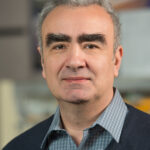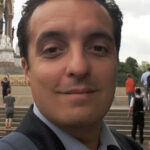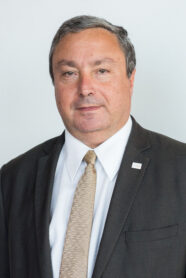Keynote 1: Toward to “Lighting 4.0” era, the SSL2 (Sustainable Smart Lighting x Solid State Light sources) concept
Prof. Georges ZISSIS, PhD, SMIEE, Vice-Rector Toulouse 3 University (2020-23). Born in Athens in 1964, has graduated in 1986 from Physics department of University of Crete in general physics. He got his MSc and PhD in Plasma Science in 1987 and 1990 from Toulouse 3 University (France). He is today full Professor in Toulouse 3 University (France). His primary area of work is in the field of Light Systems Science and Technology. He is especially interested in the sustainable smart lighting systems; system and metrology issues for solid-state lighting systems; standardization and quality issues for light sources; impact of lighting to energy, environment, quality of life, health and security; illumination and lighting. He is director of “Light & Matter” research group of LAPLACE that enrols 20 researchers. He won in December 2006 the 1st Award of the International Electrotechnical Committee (IEC) Centenary Challenge for his work on mesopic vision standardization for urban lighting systems (in conjunction with IEEE, IET and the Observer). In 2009, he won the Energy Globe Award for France and he got the Fresnel Medal from the French Illuminating Engineering Society. He was President IEEE Industrial Application Society (2019-20), and President of the Power Electronics, Electronics, Optoelectronics and System section of the French National Council of Universities (2014-19). He initiated and he chairs the IEEE Smart Lighting Initiative under IEEE Future Directions umbrella.
Abstract: During the last decade, SSLs-Solid-State Lighting based on components like LEDs, OLEDs and LDs, challenges conventional technologies. In particular, LED has turned into a game changer beating the conventional technologies in all aspects. It is therefore anticipated that in short term, all of electric lighting will be based on SSLs. Today, SSLs proceed to the projected conclusion: replacing all legacy technologies, this is a major change in the lighting market that is considered as a revolution. Artificial light absorbs 13-14% of the world’s electricity annual production. Today, we are witnessing a transition from the conventional “analogue” lighting technologies towards “digital” lighting. Smart lighting will become the backbone for smart cities and homes. Smart lighting concept leads towards the heart of the “Internet of Things”. Further, to serve society as effectively as we could, Industry has coined a new term “human-centric lighting” (HCL) to direct its primary efforts in meeting human needs. The objective is switching to smart human-centric lighting driven by both “efficiency” and “quality of light”. But this forecast could be severely affected by the “rebound effect” described by Jevons in mid-19th century. Switching to the SSL2 concept, which consists of sustainable smart lighting systems based on solid-state lighting devices, might be one way to stop that harmful effect. Smart, human-centered lighting that incorporates light quality is driven by “appliance efficiency.” This merely suggests that the “Right Light” should be provided by next-generation lighting systems with the best levels of quality and efficiency when and where it is needed. This keynote will highlight all the above-mentioned issues and will focus on the future of the lighting systems and their contributions to the sustainable development of smart cities.
Keynote 2: AI-Assisted Material Design for Smart Cities
 Dr. Marius Stan is a scientist and author in Chicago, U.S.A. He obtained his bachelor’s degree in physics from the University of Bucharest and his PhD in chemistry from the Institute of Physical Chemistry of the Romanian Academy. After moving to the U.S. in 1997, Dr. Stan was a Senior Scientist at Los Alamos National Laboratory. In 2010 he moved to Chicago as Senior Scientist at Argonne National Laboratory and Associate Professor at the University of Chicago and Northwestern University. From 2013 to 2015 he was National Director of Advanced Modeling and Simulation at the U.S. Department of Energy, during the Obama administration. Dr. Stan uses artificial intelligence (AI) and high-performance computer simulations to understand and predict the properties of complex systems with applications in energy, material design and electronics. He has extensively published in scientific literature and holds several patents. In 2021 he decided to devote himself to personal projects centered on the use of artificial intelligence in science, technology, and art. Dr. Stan is currently writing a book on human and artificial intelligence.
Dr. Marius Stan is a scientist and author in Chicago, U.S.A. He obtained his bachelor’s degree in physics from the University of Bucharest and his PhD in chemistry from the Institute of Physical Chemistry of the Romanian Academy. After moving to the U.S. in 1997, Dr. Stan was a Senior Scientist at Los Alamos National Laboratory. In 2010 he moved to Chicago as Senior Scientist at Argonne National Laboratory and Associate Professor at the University of Chicago and Northwestern University. From 2013 to 2015 he was National Director of Advanced Modeling and Simulation at the U.S. Department of Energy, during the Obama administration. Dr. Stan uses artificial intelligence (AI) and high-performance computer simulations to understand and predict the properties of complex systems with applications in energy, material design and electronics. He has extensively published in scientific literature and holds several patents. In 2021 he decided to devote himself to personal projects centered on the use of artificial intelligence in science, technology, and art. Dr. Stan is currently writing a book on human and artificial intelligence.
Abstract:Designing improved materials and processes requires a comprehensive evaluation of data and model quality. With the volume, variety and rate of data generation continuously increasing, human analysis becomes extremely difficult, if not impossible. In this talk, the concept of “intelligent software” is discussed. The software includes elements of Artificial Intelligence such as machine learning and computer vision, coupled with reduced-order modeling and Bayesian statistics. The value of the approach is illustrated using examples of material design of battery electrodes and computer memory for smart city applications. The results show that the machine learning algorithm reduces the design time and effort by a factor of 10 – compared to quantum mechanical calculations – while maintaining accuracy. The intelligent program finds the optimal inter-atomic potential and crystal structure improving the material properties. Furthermore, a discussion of current and future applications of AI demonstrates that the human-machine partnership can positively impact the intelligent design of smart cities.
Keynote 3: The Role of Energy Communities in the Energy Transition Towards Smart and Sustainable Cities
Pierluigi Sia no, (M’09-SM’14) received the M.Sc. degree in electronic engineering and the Ph.D. degree in information and electrical engineering from the University of Salerno, Salerno, Italy, in 2001 and 2006, respectively. He is a Professor and Scientific Director of the Smart Grids and Smart Cities Laboratory with the Department of Management & Innovation Systems, University of Salerno. Since 2021 he has been a Distinguished Visiting Professor in the Department of Electrical & Electronic Engineering Science, University of Johannesburg. His research activities are centered on demand response, energy management, the integration of distributed energy resources in smart grids, electricity markets, and planning and management of power systems. In these research fields, he has co-authored more than 700 articles including more than 410 international journals that received in Scopus more than 18000 citations with an H-index equal to 65. In the period 2019-2022 he has been awarded as a Highly Cited Researcher in Engineering by Web of Science Group. He has been the Chair of the IES TC on Smart Grids. He is Editor for the Power & Energy Society Section of IEEE Access, IEEE TRANSACTIONS ON POWER SYSTEMS, IEEE TRANSACTIONS ON INDUSTRIAL INFORMATICS, IEEE TRANSACTIONS ON INDUSTRIAL ELECTRONICS, IEEE SYSTEMS.
no, (M’09-SM’14) received the M.Sc. degree in electronic engineering and the Ph.D. degree in information and electrical engineering from the University of Salerno, Salerno, Italy, in 2001 and 2006, respectively. He is a Professor and Scientific Director of the Smart Grids and Smart Cities Laboratory with the Department of Management & Innovation Systems, University of Salerno. Since 2021 he has been a Distinguished Visiting Professor in the Department of Electrical & Electronic Engineering Science, University of Johannesburg. His research activities are centered on demand response, energy management, the integration of distributed energy resources in smart grids, electricity markets, and planning and management of power systems. In these research fields, he has co-authored more than 700 articles including more than 410 international journals that received in Scopus more than 18000 citations with an H-index equal to 65. In the period 2019-2022 he has been awarded as a Highly Cited Researcher in Engineering by Web of Science Group. He has been the Chair of the IES TC on Smart Grids. He is Editor for the Power & Energy Society Section of IEEE Access, IEEE TRANSACTIONS ON POWER SYSTEMS, IEEE TRANSACTIONS ON INDUSTRIAL INFORMATICS, IEEE TRANSACTIONS ON INDUSTRIAL ELECTRONICS, IEEE SYSTEMS.
Abstract: Facilitated by experimentations, such as the ones of energy communities, new actors are emerging with the role of aggregators and other intermediaries acting as service providers. Furthermore, looking at the multiplicity of actors’ roles deriving from the energy transition, the shift underway in energy access is resulting in electricity consumers becoming prosumers, i.e., consumers who are also producers of renewable energy and who use that energy more intelligently and efficiently. In other words, citizens are starting to become less dependent on energy companies. The design of new distributed architectures and methods able to cope with the issue of scalability in smart grids and microgrids consisting of several distributed energy resources is fundamental. A novel scalable and privacy-preserving distributed parallel optimization that allows the participation of large-scale aggregation of prosumers with residential PV-battery systems in the market for the ancillary services is proposed. To consider both reserve capacity and reserve energy, day-ahead and real-time stages in the ASM are considered. The proposed LP-based optimization can be easily coded up and implemented on microcontrollers and connected to a designed Internet of Things (IoT) based architecture. Both day-ahead and real-time proposed optimization methods, by allocating the computational effort among local resources, are highly scalable and fulfil the privacy of prosumers.
Keynote 4: Data Driven City Specific Engagements and Technology enablement for combating Climate Change issue

Dr.Mrs Surekha Deshmukh has over 22 plus years of professional experience. Her current role is Domain Consultant, Sustainability Practice, TCS, Pune. Dr Surekha is senior member of IEEE and Chair of IEEE Pune Section and Chair- PES India Chapters Council. She also serve as a Member of IEEE’s Climate Change Committee (CCIRCC) and chair of Sub Committee of CCIRCC–Global Visibility. She has published 35 papers tills date on areas of interest are Sustainability, Climate Change, Artificial Intelligence and Data Analytics, Electrical Safety, Electric Vehicles, Power Market, Power System Operation and Control, Reliability Analysis and Smart Grid. Dr Surekha is awarded with “ Outstanding Volunteer Award” of IEEE India Council-2020, Women in Power Award- 2021, IEEE PES Outstanding Engineer Award 2022. Women In Engineering Recognition by IEEMA-from ELECRMAMA in Feb 2023 Dr Surekha remarkably contributed at global IEEE events as Resource person, Tutorial speaker, keynote speaker, Session chair, Panelist etc.
Abstract: Topic revolves around the city specific action plan for combating climate change and achieve sustainable development goals aligned to city. Looking at the global adaptation towards decarbonization, energy transition, there is huge potential to apply bottom-up approach at cities. The active involvement of citizen, city authorities, NGOs, industry , schools , colleges etc into the movement of making city livable, clean, green and healthy. The keynote would cover the detailed examples of data and technology enablement in developing solutions to address city specific issues and concerns. Also, examples would demonstarte critical role of IEEE in responding to climate change.
